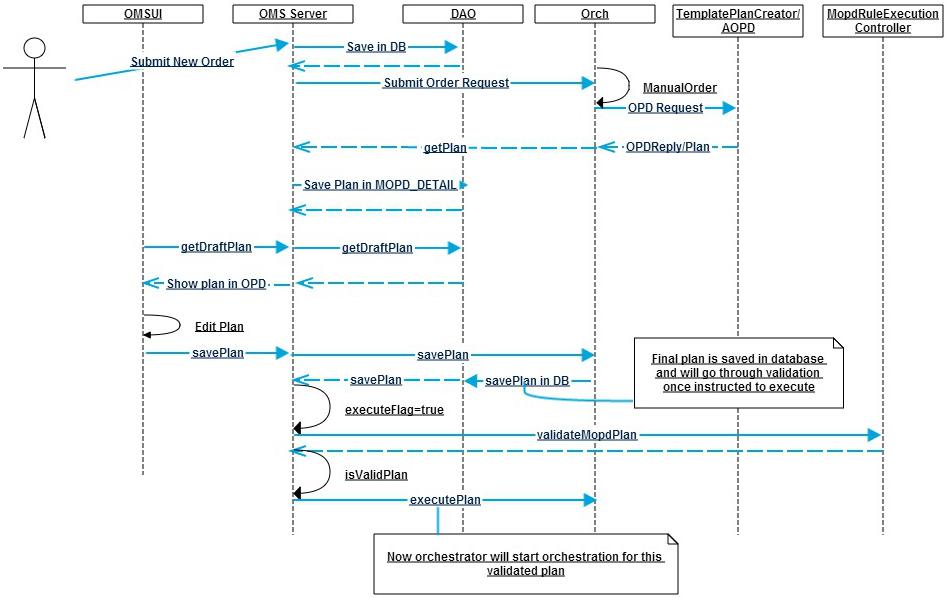Processing New Order with Manual Order Plan Development Enabled
The sequence diagram for processing a new order with Manual Order Plan Development enables is as follows:
For a newly submitted order, a template plan is generated which can be edited by the user from TIBCO Order Management - Long Running UI. This template plan can be generated using following template implementation:
The following table provides the implementation details for generating template plan. Some of these implementations are supported by the application and user customization of implementation is also supported.
| Property Name | Property Value | Usage |
|---|---|---|
| com.tibco.fom.orch.mopd.templatePlan | No | No Template Implementation is used. |
| Default | Default Template Implementation is used. | |
| Custom | Custom Template Implementation is used. Fully qualified class name of custom implementation is used by specifying property com.tibco.fom.orch.mopd.customTemplatePlanCreator. | |
| JMS | JMS Template Implementation is used | |
| AOPD | AOPD is used to generate template plan |
No Template Implementation
No Template Implementation is supported by the application. The template plan generated have a plan wrapper without any plan item details. Configure the property by using the following code:
<ConfValue description="Template for Mopd plan generation" isHotDeployable="true" name="Template for Mopd plan generation" propname="com.tibco.fom.orch.mopd.templatePlan" readonly="false" sinceVersion="3.0" visibility="Basic"> <ConfString default="AOPD" value="No" /> </ConfValue>
Default Template Implementation
Default Template Implementation is also supported by the application. The template plan generated have plan details with one plan item details for each order line mentioned in the order details. Configure the property by using the following code:
<ConfValue description="Template for Mopd plan generation" isHotDeployable="true" name="Template for Mopd plan generation" propname="com.tibco.fom.orch.mopd.templatePlan" readonly="false" sinceVersion="3.0" visibility="Basic"> <ConfString default="AOPD" value="Default" /> </ConfValue>
Custom Template Implementation
Custom Template Implementation can be implemented by the user. The details for implementing custom template to generate plan are as follows:
- Create a new java project in IDE with omsCommon.jar in build path.
- Implement an interface with name com.tibco.aff.oms.server.jms.orch.mopd.MOPDTemplate.
- Build the code and include the .class/jar file in WEB-INF/classes(.class) or WEB-INF/lib(jar) folder of omsServer.war.
- Configure the following property through the Configurator:
<ConfValue description="Template for Mopd plan generation" isHotDeployable="true" name="Template for Mopd plan generation" propname="com.tibco.fom.orch.mopd.templatePlan" readonly="false" sinceVersion="3.0" visibility="Basic"> <ConfString default="AOPD" value="Custom" /> </ConfValue>
- Configure the implemented class name through Configurator:
<ConfValue description="Template for Mopd plan generation" isHotDeployable="true" name="Template for Mopd plan generation" propname="com.tibco.fom.orch.mopd.templatePlan" readonly="false" sinceVersion="3.0" visibility="Basic"> <ConfString default="" value="" /> </ConfValue>
- Redeploy the Order Management Server.
- A sample do-nothing implementation is included with distribution in
omsCommon.jar with the name
com.tibco.aff.oms.server.jms.orch.mopd.custom.CustomMOPDTemplateImpl. This is only for testing and it does not generate a valid plan to proceed further. If enabled, the following logs are generated:
Generate template plan through {} for orderID {}. - By default, blank value is present in the Configurator that indicates no plan generation by custom implementation.
JMS Template Implementation
<ConfValue description="Template for Mopd plan generation" isHotDeployable="true" name="Template for Mopd plan generation" propname="com.tibco.fom.orch.mopd.templatePlan" readonly="false" sinceVersion="3.0" visibility="Basic"> <ConfString default="AOPD" value="Jms" /> </ConfValue>
You can configure the JMS destination for publishing request payload to generate plan by using the following property:
<ConfValue description="Queue for sending orderrequest to generate template plan for MOPD" isHotDeployable="true" name="Queue for sending orderrequest to generate template plan for MOPD" propname="com.tibco.fom.oms.orch.mopd.template.orderrequest.sender.queue" readonly="false" sinceVersion="3.0" visibility="Basic"> <ConfString default="" value="" /> </ConfValue>
You can configure JMS destination for receiving the template plan payload by using the following property:
<ConfValue description="Queue to receive response of generated template plan for MOPD" isHotDeployable="true" name="Queue to receive response of generated template plan for MOPD" propname="com.tibco.fom.oms.orch.mopd.template.orderresponse.response.queue" readonly="false" sinceVersion="3.0" visibility="Basic"> <ConfString default="" value="" /> </ConfValue>
The default value is always blank for the configuration.
Using Automated Order Plan Development
The plan is generated by Automated Order Plan Development. Configure the property by using the following code:
<ConfValue description="Template for Mopd plan generation" isHotDeployable="true" name="Template for Mopd plan generation" propname="com.tibco.fom.orch.mopd.templatePlan" readonly="false" sinceVersion="3.0" visibility="Basic"> <ConfString default="AOPD" value="AOPD" /> </ConfValue>
This is the default configuration to generate template plan.

